7 Proven Steps on How to Make Money Online Writing Articles

Anúncios
In this blog post, we will share the exact 7 proven steps on how to make money online writing articles. In fact, these are the steps we implemented to grow our website in the last 9 months. So, we thought this post might be valuable for those who want to do the same.
If you’ve read our income report, you might notice we didn’t make any money in the first two months. However, everything changed in the third month onward. So far, we’ve published more than 100 posts on our website and earned more than $1,000+ from various sources.
Anúncios
We’ve learned a thing or two in the past couple of months, and we thought we could give you a hint on how to make money online writing articles. Based on our experience, these steps would work well if you’re aiming to write a review about a product or service related to your niche.
So, without further ado, let’s dive in!
Anúncios
Step 1: Establish Your Niche
Generally speaking, a niche is something you are interested in. It could be something you already know well enough or want to learn more about. As a rule of thumb, your niche should be specific and less competitive than what is already on the internet.
There are three big niches that most people are interested in writing about:
- Wealth
- Health
- Relationships
However, these niches are considered competitive because there have been a lot of resources about them. If you’re interested in writing about these niches, you might want to narrow it down.
For example, if your niche is health, you could narrow it down to men’s health and grooming in their 30s. Choosing this niche will give you a competitive advantage in targeting the right audience in the long run.
Another example would be the wealth niche. If your aim is to write about making money online, you won’t stand a chance against sites with higher domain authority, such as NerdWallet. To narrow it down, you can be more specific, like how to make money online as a freelancer.
In short, establishing your niche is essential in providing the right direction and standpoint on what you will talk about to your target audience. Moreover, it will help you establish your identity as an expert in your preferred niche.
Benefits of Establishing a Niche
There are several benefits if you can establish your niche before starting to write about them.
- Having a laser-focused niche will help you create a path on what to write. In other words, you’re setting a boundary to only write articles within your niche or sub-niche.
- You can further expand your niche as your audience grow. It’s a common thing to cover more topics related to your sub-niche. For example, if you’re interested in writing about minimalist tech accessories, you can expand it later to cover other tech accessories, such as everyday carry (EDC).
- Having a niche will attract businesses and open up opportunities. For example, some of our reviews are categorized as sponsored posts, such as FlexClip, DesignCap, DesignEvo, and Visme. These brands approach us to write a review about their product or service. In return, we get free access to their products and explore their features.
- A well-established niche will attract relevant websites or blogs to work with you. For example, other people might invite you to write on their website as a Guest Contributor due to your expertise. This will help you gain more audience and traffic in the long run.
Things to Avoid After Establishing Your Niche
After establishing your niche, there are several things to avoid to ensure you’re on the right track.
- Staying out of your niche. This is one of the common mistakes people make after deciding their niche. For example, if you’re writing reviews about health supplements, there is no way you could write about AI copywriting tools. It doesn’t make any sense. This will confuse your target audience because they don’t understand your identity.
- You’re only selling affiliate links without giving value to your audience. Apart from promoting a product or service related to your niche, you should also provide valuable information to your audience. That’s why we strongly recommend having a dedicated blog section to provide answers to questions related to your niche.
- Writing thin content about your niche. If your content has no value to your visitor, there is no reason to visit your site. This kind of content is what you should avoid when writing articles about your niche. Some of the cases we know are related to stealing someone else’s posts and utilizing AI to rewrite and publish them as their own.
- Writing to please SEO. This is an advanced mistake people make when they try to rank on search engines. It’s a common practice to use an SEO plugin or keyword research tool to guide you when writing about your niche. At the end of the day, you should remember that it’s not SEO that reads your article. There is a human being reading them.
Step 2: Choose Your Platform
Once you’ve established your niche, the next thing you should do is choose a platform to write your content. Based on our experience, having your own website is one of the best ways to build your foundations to make money online by writing articles.
However, in the last 9 months, we’ve seen a lot of people keen on creating and maintaining a website. It’s a demanding task, and we can understand it. Moreover, many people still think you need design skills and coding to run a website. But if you use WordPress or any other similar platform, you do not need to have those skills.
Now, pay attention to the title of this step. We didn’t say you must have a website, but you should choose a platform to write your content. Otherwise, you can’t get people to see the articles you write.
If you’re not into creating a website, there are other platforms you could consider, such as Medium and LinkedIn. Both platforms are great for writing long-form articles and have high domain authority. So, you get the chance to rank on search engines for the article you write.
But, as we said earlier, it would be better to create your own website because it will look more professional and credible to your audience. To help you understand the flow of creating a website, we have prepared an illustration—as you can see below.
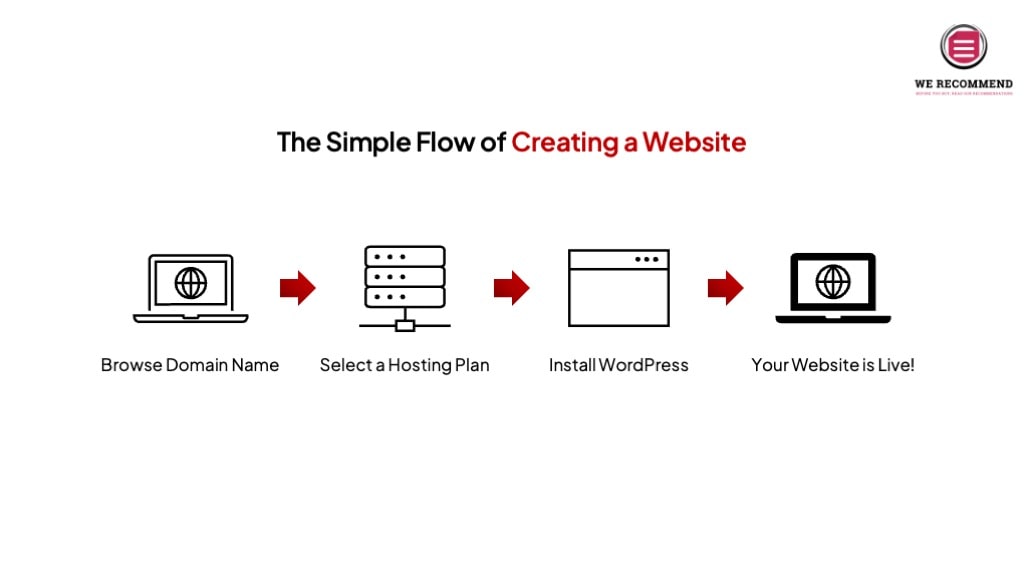
We strongly recommend using Namecheap to browse and purchase your domain name. It’s the cheapest we’ve found so far. Depending on your domain name and availability, a .com extension starts from $6,98 per year.
As for hosting, you will love using Rocket.net. It’s the fastest WordPress hosting out there. Getting fast WordPress hosting is necessary to establish your website and appeal to your target audience. In fact, our website is hosted on Rocket.net. If you already have a website and want to migrate your hosting, there is a $1 launch special to try their service.
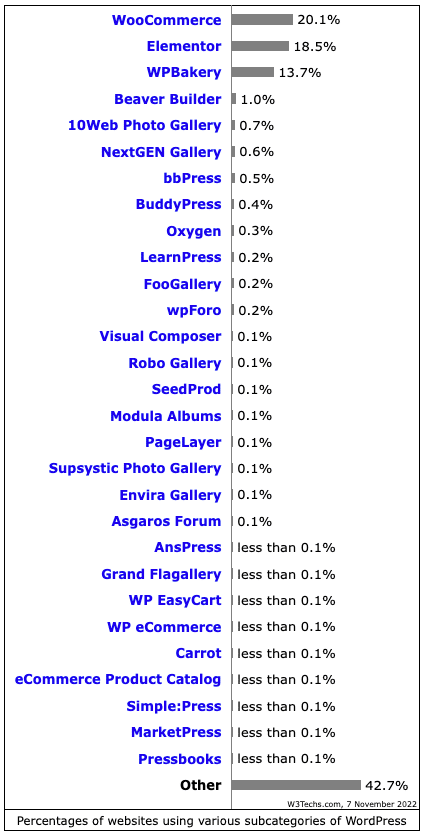
The reason for using WordPress as your content management system is its versatility. According to the data from W3Techs, 64,2% of all websites use WordPress as their CMS. Unless you plan on creating an eCommerce website, you might consider other CMS such as WooCommerce and Elementor.
Once everything is set, your website is ready to launch and conquer the internet.
Benefits of Writing on Medium or LinkedIn
There are several benefits if you choose Medium or LinkedIn as your platform to write content about your niche.
- You don’t have to spend money on a domain name and hosting plan. Creating a website will cost you money, at least for buying a domain name and hosting plan. On the other hand, writing on Medium or LinkedIn is free. In fact, many people use these platforms to write reviews and grow their audience.
- You can post affiliate links on Medium and LinkedIn. There are no restrictions to promote affiliate links in articles you write on Medium or Linkedin.
- Both platforms already have an audience. When you publish articles on Medium or LinkedIn, you already have a potential audience inside the platform itself. So, you don’t have to worry about submitting your post URL to Google Search Console and everything else.
- You can convert your Medium blog to a website. If you keep on publishing consistently and growing your online presence, you could turn your Medium blog into a website with a .com extension. Many people have done this. Moreover, you might have seen some of the posts with featured snippets were published on Medium.
Benefits of Writing on Your Website
If you’re tempted to publish your articles on Medium or LinkedIn, hear us for a moment. There are a lot of benefits to writing on your website.
- You are establishing a long-term foundation by writing on your website. Once your website is up and running, your website has a price. People might want to acquire your website in the future. There have been many examples of websites sold for millions of dollars due to their content and audience.
- You can monetize your website with ads. Ad placement is one of the best ways to monetize your website and make money online other than writing articles. As you can see, there are various ad networks to choose from where you can earn money by running ads on your website. We still run on Google AdSense, but there are other ad networks, such as Ezoic and PropellerAds.
- You can customize your website. Unlike Medium and LinkedIn, you can customize anything on your website. You can categorize your posts, create multiple menus, rent ad space, and many more. You can’t do these things on Medium and LinkedIn.
- Having your own website improves your credibility. Once you have your own website, you establish yourself as a brand. That being said, you are credible to fully leverage your expertise and knowledge within your niche.
Things to Avoid After Choosing Your Platform
Once you choose your platform, there are several mistakes people make. We will highlight some of them and why you should avoid these mistakes in the first place.
- Not publishing consistently. It’s easy to feel stuck and not know what to write. In the early stage of your journey, creating and publishing posts will help to improve people’s awareness about you. Anyone who runs a website knows their journey starts by writing a single post.
- Not sharing your content to reach more audiences. If you think publishing your content will automatically attract people to read your content, you’re totally wrong. Any content influencer or marketer knows that getting the first few eyeballs is essential to tell people that you exist. So, once you have chosen your platform and published your post, share them.
- Not creating high-quality posts. People might be excited to publish content regularly, but there is no use if you lack quality. It’s easy to write thin content and publish them. However, your aim is to write high-quality content in the first place about your niche.
Step 3: Learn Keyword Research
The next step is essential to help you rank on search engines. If you want to get visitors to your content, your post should rank on the first page of search engines. One of the skills you need to learn is keyword research.
There are two ways to do your keyword research. One is with keyword research tools, which are used by many people, or you can use Google to find potential keywords related to your niche.
The reason for learning about keyword research is that you can’t write aimlessly and hope your post will get indexed by Google. That’s not how it works.
There are three steps before Google or other search engines rank your content in the first place.
- Crawling. Google and other search engines use crawling bots to scrape the internet and learn about your content.
- Indexing. Once search engines find your content, they will index your post and make it available online.
- Ranking. After your post is indexed on search engines, they will analyze your content and rank them according to the keywords you use on your content.
Generally speaking, this process could take a few days to months if your content is new. If you’re running a WordPress website, we strongly recommend downloading our ebook to help your post get indexed on Google within 72 hours.
How to Get Your Post Indexed on Google Within 72 Hours*
This ebook will help get your post indexed on Google within 72 hours*. It’s free for a limited time.
*Every site is different. But, based on our experience, it works in almost every niche. As long as your posts consist of at least 600 words, you should be fine.
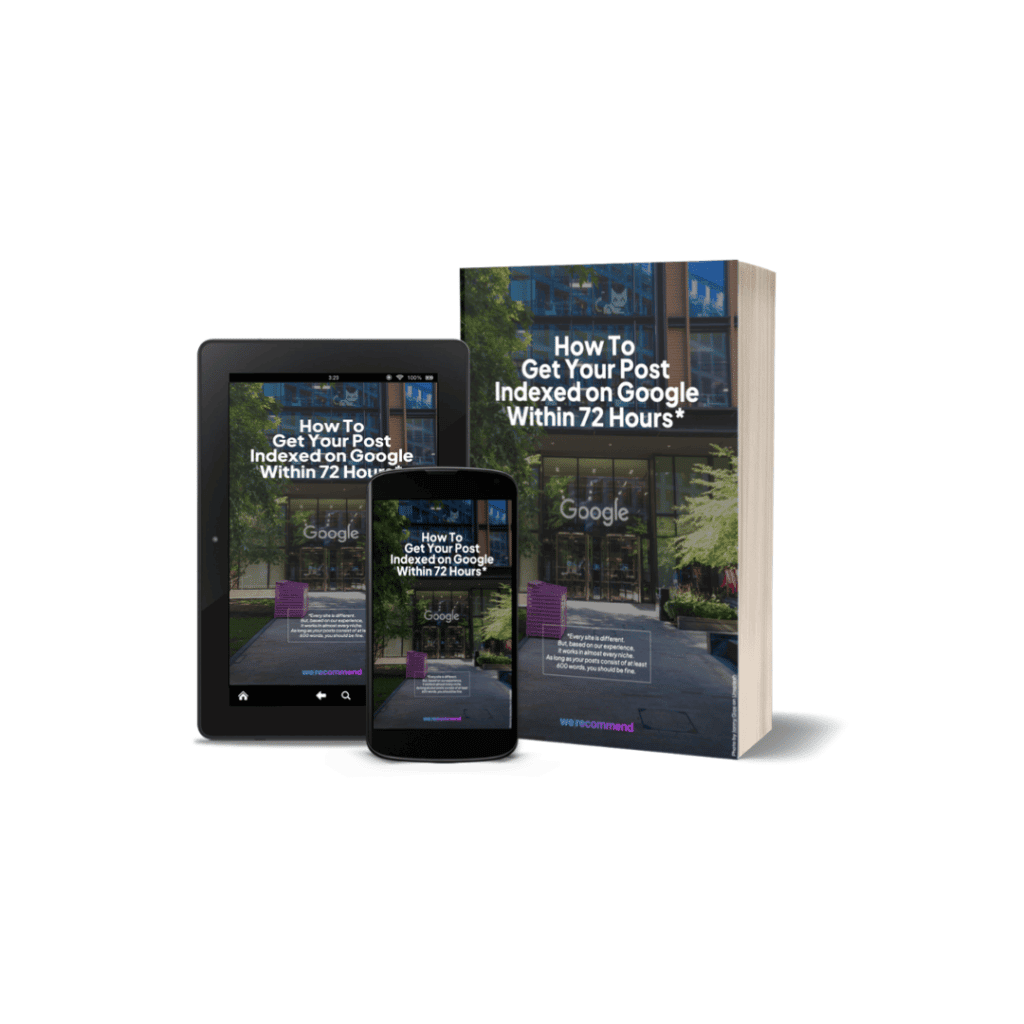
Keyword research is related to search engine optimization or SEO. That being said, optimizing your post for search engines while satisfying the search intent is necessary to provide value to your target audience.
If you plan on using a keyword research tool, there is one that we strongly recommend using, and that is Wordstream. Here’s an example of the result you’ll get on Wordstream.
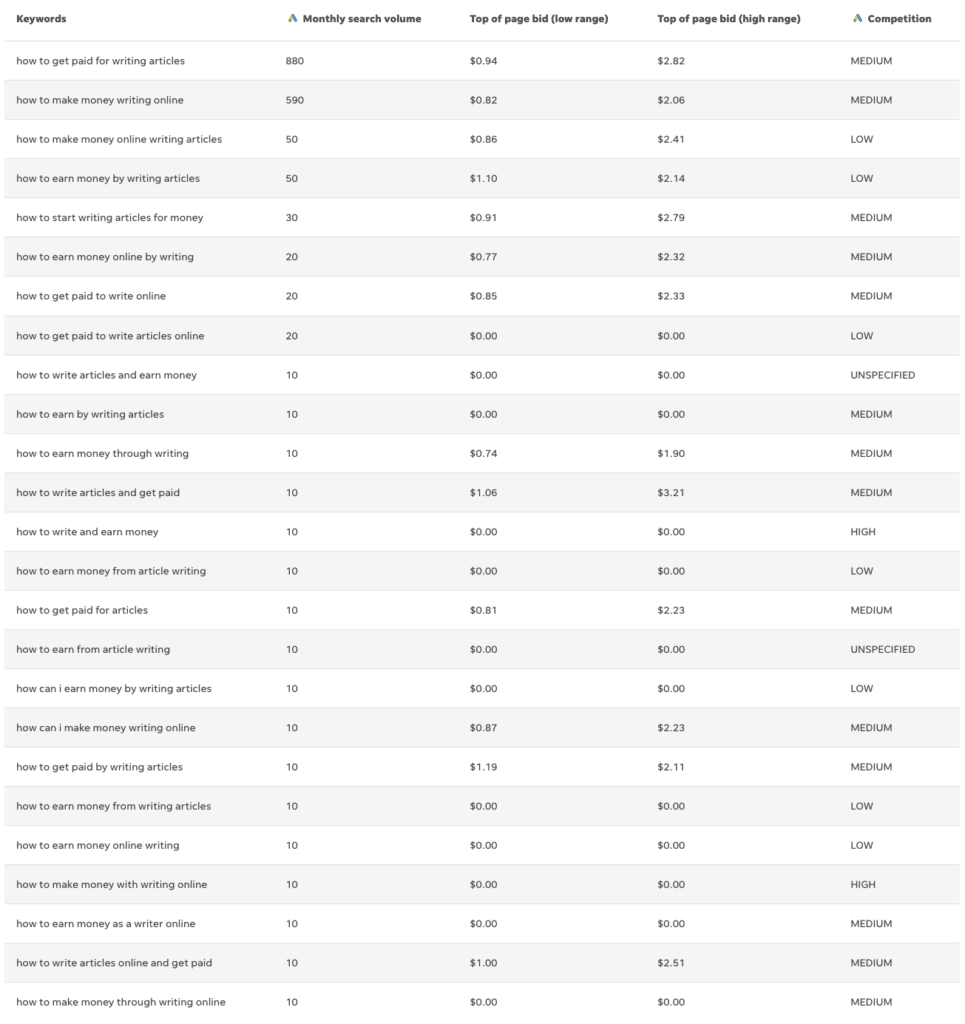
As you can see, you will get results on monthly search volume, top-of-page bids in both the low and high ranges, and the competition level of the keywords you are targeting. Since these data are based on Google Keyword Planner for Google Ads, you can expect low-competition keywords to be easier to rank.
If you don’t want to use a keyword research tool, you can also use Google to find potential long-tail keywords related to your niche. Many people still confuse long and short-tail keywords. Generally speaking, you should always aim to find long-tail keywords to increase your chance of ranking in search engine results.
For example, instead of aiming to rank on keywords like “best shoes,” which is a short-tail keyword, it would be better to target long-tail keywords like “best shoes to wear for job interviews.” Moreover, it’s easier to write content around those keywords.
We happened to write a comprehensive step-by-step guide on using Google to do keyword research. Read our post if you need an example of finding keywords related to your niche.
Things to Avoid When Doing Keyword Research
There are several things you should avoid when doing keyword research, especially if you’re using keyword research tools to do it.
- Not checking the actual search result. As far as we know, no keyword research tool can pull real-time search queries and provide you with accurate results all the time. That’s not just how it works. You should always check the actual search result to find out if those keywords are too competitive for you. One indicator that signs a keyword is too competitive is when you see ads and high domain authority on the search results.
- Still aiming to outrank high authority domains. It might seem we’re putting a dumb statement, but in reality, many people still think they could outperform high-authority domains by creating better content. It’s just impossible. Why? High-authority domains have been around for years and have published thousands of articles long before your site was even born. You can’t compete with them. So, don’t think better and longer content will suddenly get you on the first page of search results.
- Thinking about merging several long-tail keywords in one post. If you are writing a listicle, this one might work well. Generally, one long-tail keyword should be covered by one article. There might be an overlap between several long-tail keywords inside your post, but your primary aim is to cover one topic in one post.
Step 4: Learn Affiliate Marketing
Once you have learned the basics of keyword research, you should fully understand how affiliate marketing works to make money.
We don’t want to bore you with a long explanation about affiliate marketing since we’ve already covered a lot in other posts. But, to save you some time, we prepared a simple workflow to understand how affiliate marketing works.
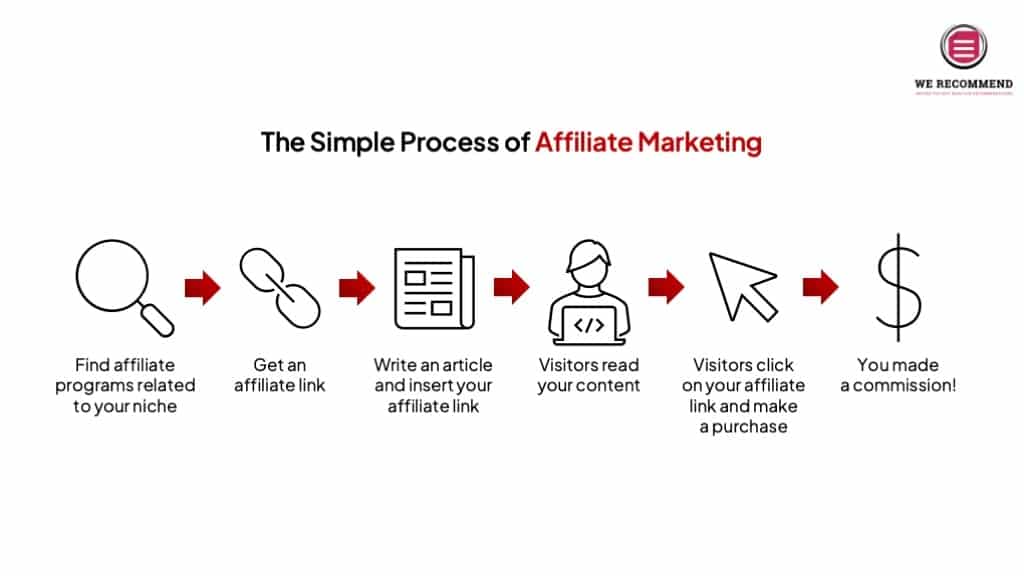
As you can see from the workflow above, you need to find and apply to affiliate programs related to your niche. It makes no sense to join affiliate programs about making money online when your website is talking about pet care.
Affiliate marketing is about promoting other people’s products or services on their behalf by using what is called an affiliate link on your content. This link is unique only to you, and you will get paid if someone purchases a product through your affiliate links.
Since affiliate marketing is a performance-based marketing model, you are getting paid based on effort in creating valuable information for your targeted audience. However, sharing ‘naked’ affiliate links on social media wouldn’t get you anywhere. You will get clicks, but your audience wouldn’t understand a thing because you don’t create anything valuable.
So, one of the best ways to promote affiliate links is by writing articles about your niche and providing a solution—your affiliate product or service to solve your audience’s problem.
For example, many of our reviews attempt to solve problems related to copywriting, content creation, and email marketing. It might seem like we are selling something. But, in reality, we are recommending stuff we think it’s worth using.
It’s up to our readers if they resonate with our reviews and decide to purchase the product and/or service we have recommended. That’s why we always write a disclaimer right before every post.
You can download our free ebook on how to start affiliate marketing with no money in 2022. This ebook contains infographics and helpful tips to guide you throughout the journey in the early stage.
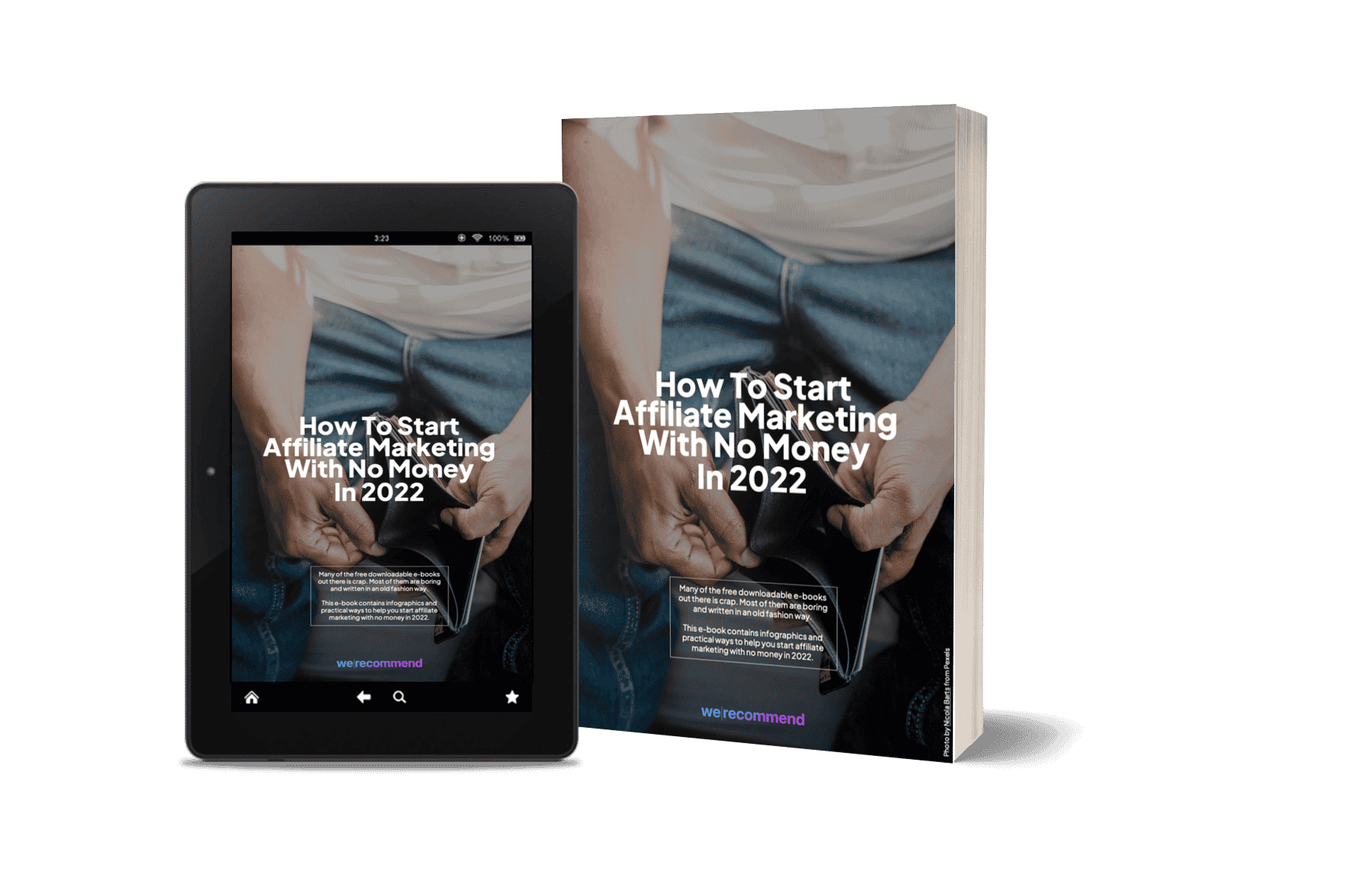
How to Start Affiliate Marketing With No Money in 2022
Many of the free downloadable ebooks out there is crap. Most of them are boring and written in an old fashion way. This ebook contains infographics and practical ways to help you start affiliate marketing with no money in 2022.
Things to Avoid When Applying for Affiliate Programs
There are plenty of affiliate programs all over the internet, and you can always find something by searching on Google with this keyword: your niche + affiliate program. However, you shouldn’t jump too fast and apply to various affiliate programs.
Based on our experience, there are several things you should notice when you apply to affiliate programs related to your niche.
- Not studying your niche and the competition. Believe it or not, there will always be someone who has already promoting your the stuff you plan on promoting. These guys are your competition. So, you should level up your playing field by studying how they write and promote their content. Find out how you can write better content and provide more value.
- Not having any content. When you apply to affiliate programs, they might ask you about your website and how you would like to promote their product. So, before submitting your application, it would be great if you already have content on your website. Aim to publish around 30 posts in the first two months.
- Not having any traffic. The reason for having traffic is pretty straightforward. If your website doesn’t have any traffic, it would be a waste of time for a brand to approve your application. Although some programs do not require traffic, we strongly recommend having enough monthly traffic before applying.
Step 5: Start Writing
Once you have accomplished every step above, it’s time to write valuable content for your targeted audience. Since you already learn about keyword research, your primary objective is to write informational posts in the early stage.
Try to answer questions about your niche, and don’t ever think about adding affiliate links at first. You can always add them later and expand your article in the future. Research all the 5W+1H questions and try to answer them by providing valuable opinions from your point of view.
Before writing your content, set up a to-do list of what you want to write about. For example, if your niche is about making money online as a side hustle, you can try to answer questions like:
- When is a side hustle a good idea?
- What side hustles to make $100 per day?
- How can you tell side hustle is worth the hassle?
- What’s a good and easy side hustle?
These questions will help you create valuable informational posts for your platform. Moreover, you can find suitable affiliate links related to your solution later on and add them to your post.
Pro Tip????
If you’d like to know our best recommendation for a free to-do list app, you should read our Todoist review.
Things to Avoid When Writing Articles
When writing you are writing articles about your niche, you should avoid these mistakes, as they will only slow you down from making money online. You might want to save this because it’s quite a long list.
- Worrying too much about traffic in the first two months. Based on our experience, you shouldn’t expect anything in the first two months because you are (literally) no one on the internet. Nobody knows about you and your presence. So, stop checking Google Search Console and Google Analytics every day. Focus on writing valuable content.
- Assuming that your audience knows what you’re talking about. If you think you don’t need to explain any terms because your audience might already know about them, you’re wrong. Imagine how many articles are out there talking about affiliate marketing. Millions. So, avoid this mindset and add more value by explaining complex terms with simple sentences.
- Not paying attention to grammatical errors and mistakes. Would you like to read something with typos and plenty of grammatical errors? We don’t think so. Always double-check everything before publishing your articles. This is especially true if English is not your first language. We recommend using Grammarly to write your articles before pasting them to your website.
- Writing without thinking about your audience in the first place. You should write as if you’re talking to one single audience. Imagine only one person reading your article. You want to make every sentence serves its function in delivering your thoughts in a logical sequence. Try your best to avoid confusion for your audience.
- Not utilizing both short and long sentences. Try to balance your articles with short and long sentences to help your audience follow your message as they are involved in a conversation.
- Not adding supporting graphics and videos when needed. Images and videos help captivate your audience’s attention so that they are not reading text all the time. It breaks down your entire article and makes them want to stay longer on your website. However, add images and videos when it’s necessary. Everything in your post should serve a purpose to emphasize your message or help illustrate something better than you could explain in sentences.
- Not being honest. When you are writing reviews, it pays to be honest with your opinion. Your audience would also expect that from you. When a product or service is not good enough, we state them in our review. If you’re not being honest because your intention is to make people buy through your affiliate link (sooner or later), people will find out. Dishonesty will only do more harm than good.
- Not providing a clear answer. It might seem obvious, but many articles and reviews didn’t answer the question they put on their headline. For example, one of our reviews about List Infinity has this question on its headline: Is it Worth Promoting? That’s the question we must ask and provide at the end of our review. So, before publishing your articles, have you answered the initial question for your audience?
- Worrying about keyword density. If you’re using an SEO plugin, you might notice one of the indicators to write SEO-friendly content is keyword density. However, it’s not as relevant as it was a few years ago. Although you don’t have to worry too much about keyword density, you should avoid keyword stuffing at any cost.
- Not providing a call to action for your audience to take action. If your goal is to make money online by writing articles, adding a call to action is necessary to help your audience check your solution. Otherwise, why would you recommend the stuff you reviewed in the first place, right?
- Not providing an alternative if you don’t recommend something. Here’s another mistake we saw a lot of when a review didn’t recommend something in the first place. There are various reasons not to recommend a product or service to your audience. It could be because it’s a scam or an overpromising statement. But, you should always provide an alternative for a better experience for your audience. You don’t want them to leave empty-handed after visiting your site.
- Keep referring to the same program over and over again. We saw these mistakes in many articles in the MMO niche. You might come across an article saying Program A is not worth it but instead recommends Program B as an alternative. When you browse another article, you find similar things that say Program C is not worth it and refers back to Program B as the solution. This kind of article is not what you want to write. There is no one-size-fits-all alternative. It means you’re not being honest with yourself and your audience.
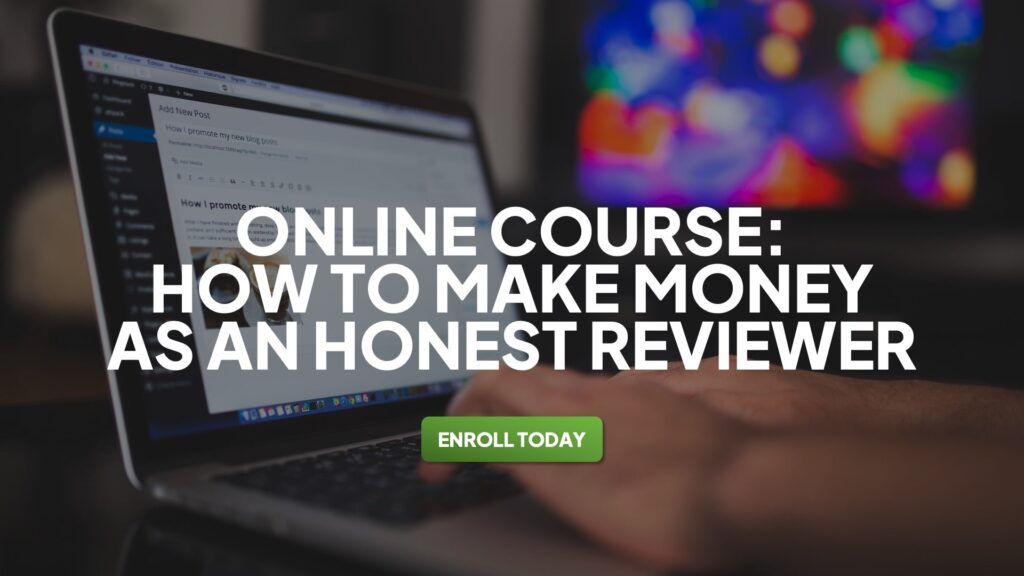
If you’d like to learn more about writing honest reviews and making money with affiliate marketing. You might want to enroll in our Honest Reviewer Online Course and use our code 25OFF to get 25% off.
Step 6: Share Your Articles
If you ever think about not sharing your article and letting search engines do their magic, you can leave that fairy tale right now. At any stage of your journey to making money online by writing articles, you should always share your articles on social media, email, and other relevant platforms.
It’s always a good idea to share articles on social media as long you’re not spamming people with ‘naked’ affiliate links. People are interested in reading articles and learning something new every day, and ‘naked’ affiliate links don’t have any context whatsoever for your audience.
Generally speaking, you should cover at least 3-4 social media platforms from these lists: Facebook, Twitter, Instagram, Pinterest, LinkedIn, Quora, and YouTube. If you can cover all of them, that would also be great. But, at the early stage, don’t overdo it, as it will consume more time and effort. Remember, your primary focus is to write valuable articles.
Sharing your articles on social media will attract potential audiences to your website. Moreover, there is a chance your audience could also re-share them with their audience, which will boost your online presence.
Things to Avoid When Sharing Your Articles on Social Media
There are several things you should avoid when sharing your articles on social media, pay attention to number 3 in this list.
- Only sharing once. If you think sharing your article once is enough, you should ask yourself, “How many people saw your tweet or post when you shared it?” People are not active on social media 24/7, so don’t be afraid to share more than once.
- Not customizing your social media graphics accordingly. Instagram, Pinterest, Facebook, and LinkedIn all have different post sizes. A design template you use for your Instagram posts will not work on Pinterest. So, customizing them according to each social media platform you use is a good idea to blend in.
- Not customizing your social media copy. If you only share your article link and hope someone will miraculously re-share them and engage with you in a conversation, you might be daydreaming all along. There are hundreds, if not thousands, of social media posts every second. If you’d like to stand out from the rest of your competition, you should customize your social media copy. You can use emojis, ask a question on your post, use analogies, and many more.
- Not mentioning the brand when you write a review about them. If you apply to affiliate programs and write a review about them, one of the best ways to engage with brands is by mentioning them in your social media post. We’ve done this a lot on Twitter, and it helps to boost our reach and impressions.
- Not engaging in a conversation. When someone responds to your post, it’s a sign to engage in a conversation. You should treat social media posts as similar to responding to a comment on your website.
Step 7: Participate in Writing Contests
If you’re still wondering how to make money online by writing articles, one final step is to submit your articles to participate in writing contests. Some affiliate programs run writing contests from time to time, such as Rank Math SEO and Payhip.
In fact, two of our articles have made $400 from Rank Math SEO. Take a look at these screenshots below.


Payhip is also one of the most generous affiliate programs that sometimes run a writing contest. The prize is also quite surprising at $500.

Things to Avoid When Participating in Writing Contests
There are a lot of benefits to joining a writing contest other than improving your writing skills and gaining more traffic to your website. However, there are also several things you should be aware of before participating in one.
- Not reading the minimum words required to enter the contest. Some contests might require you to write a minimum of 2,000 words before you can submit your article. It’s easy to miss these requirements, so you might want to read everything beforehand.
- Not covering the required topic. Always make sure you are covering the right topic before submitting your entry. Sometimes, a contest would expect you to cover a particular feature because it’s new. So, creating a general review post might not be suitable.
- Not providing a unique angle for your entry. It’s easy to replicate someone else’s post and do the same thing. However, providing a unique angle could increase your chance of winning the contest. For example, one of our articles that wins Rank Math’s monthly affiliate contests covers 9 reasons not to use the Free Version of Rank Math SEO. It provides a unique angle instead of writing a review like anyone else.
Conclusion
There you have it. These exact 7 proven steps on how to make money online writing articles are the ones we are implementing on our website. It has generated over $1,000+ since we received our commissions in the third month of our journey.
Writing articles might be one of the best ways to make money online, and following the proper steps needed will help you accelerate your progress in making money with affiliate marketing.
If you have further questions, let us know in the comment section, we are more than happy to answer them and share more of our experiences.